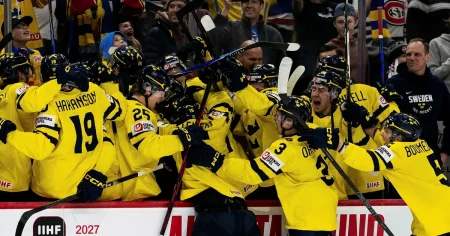Graham Potter’s highly anticipated debut as West Ham manager began with promise, only to unravel spectacularly in a gut-wrenching five-minute spell that epitomized the cruel nature of football. The Hammers, keen to impress under their new leader and eager for a deep FA Cup run, controlled much of the match against Aston Villa, showcasing glimpses of the tactical nuance and attacking flair Potter is renowned for. Their dominance culminated in a deserved lead, creating a palpable sense of optimism amongst the West Ham faithful. However, the tide turned dramatically as Aston Villa, with Swedish international goalkeeper Robin Olsen providing a steady presence between the posts, capitalized on a lapse in concentration and a sudden shift in momentum. Two swift, decisive goals in quick succession stunned West Ham, silencing the home crowd and leaving Potter to rue a missed opportunity to mark his tenure with a victory. The dramatic turnaround highlighted the fine margins in football and served as a harsh reminder of the challenges that lie ahead for the new manager.
The initial stages of the match saw West Ham dictate the tempo, patiently probing Aston Villa’s defense with their intricate passing movements. Potter’s influence was evident in the team’s structured build-up play and their fluid movement in the attacking third. They created several promising opportunities, testing Olsen’s resolve with a combination of long-range efforts and close-range attempts. The Swedish goalkeeper, however, proved equal to the task, demonstrating his shot-stopping prowess and command of the penalty area. Despite Villa’s resilience, West Ham’s relentless pressure eventually paid off. A well-worked move, showcasing the team’s improved interplay under Potter, resulted in the opening goal. The home crowd erupted in celebration, sensing a comfortable victory on the horizon. Little did they know that the game, and their emotions, were about to be flipped on their head.
Aston Villa, despite being on the back foot for much of the match, demonstrated the inherent unpredictability of cup competitions. A momentary lapse in concentration from West Ham’s defense allowed Villa to exploit a gap and snatch an equalizer against the run of play. The goal, seemingly out of nowhere, injected a renewed sense of belief into the visiting side and visibly shook West Ham’s confidence. The momentum shifted dramatically, and Villa, sensing their opponents’ vulnerability, pressed forward with increased intensity. Just minutes after leveling the score, they capitalized on another defensive error to take the lead, leaving West Ham stunned and the home crowd silenced. The two goals, scored within a devastating five-minute window, transformed the atmosphere of the match and underscored the fragility of a one-goal lead.
For Potter, the dramatic turnaround served as a harsh introduction to the realities of managing in the high-pressure environment of the Premier League. His debut, which had promised so much, ultimately ended in disappointment. The five-minute collapse exposed the defensive frailties that have plagued West Ham this season, highlighting the areas that require immediate attention. While the attacking display offered glimpses of the team’s potential under Potter, the defensive vulnerabilities ultimately proved to be their undoing. The defeat also underscored the importance of maintaining focus and concentration throughout the entire match, particularly in cup competitions where a momentary lapse can have devastating consequences.
The match also showcased the importance of Robin Olsen’s contributions to Aston Villa’s victory. While the Swedish goalkeeper might not have been directly involved in the goals scored by his team, his steady presence in goal throughout the match, particularly in the early stages when West Ham were dominant, proved crucial. His ability to thwart West Ham’s attacks and keep his team in the game during periods of intense pressure laid the foundation for the eventual comeback. Olsen’s performance was a reminder of the importance of a reliable goalkeeper, especially in knockout competitions where a single mistake can prove fatal. His composure under pressure and his shot-stopping abilities provided the platform for his teammates to stage their dramatic late comeback.
Moving forward, Potter faces the daunting task of addressing West Ham’s defensive deficiencies while continuing to implement his tactical philosophy. The FA Cup exit, while undoubtedly a setback, provides valuable lessons that can be used to refine the team’s approach. The attacking promise shown during periods of the match offers a glimmer of hope for the future, suggesting that with the right adjustments and additions, Potter can transform West Ham into a formidable force. The challenge now is to translate those positive aspects into consistent performances and ultimately, results. The road ahead will undoubtedly be challenging, but the potential for success remains if Potter can address the team’s weaknesses and harness their attacking strengths.














